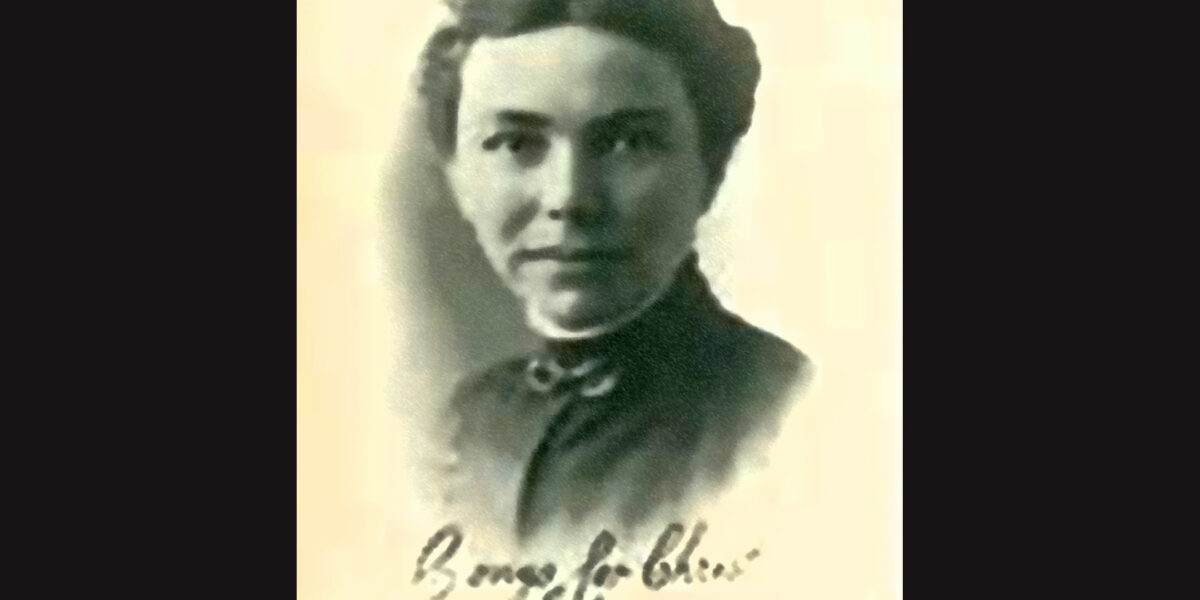ELKHART, Indiana (African Inter-Mennonite Mission/Mennonite Mission Network) – Africans called her Mama Malembe, but Alma Doering stirred up mission fervor in the American Midwest and in Europe. "Malembe" means "peace" in many Bantu languages. However, James Bertsche wrote that she was "a whirlwind of a woman" in his brief history of Africa Inter-Mennonite Mission, It’s Been God’s Doing All Along.
Mennonite Mission Network and Africa Inter-Mennonite Mission partner in ministries on the African continent.
In an era when women were taught to be silent in church, Doering addressed the annual assemblies of many denominations to promote the mission imperative. She was among the first to report on the abuses of colonial powers in Africa and the evils of the slave trade to Mennonite audiences. Her missiology, also ahead of her time, emphasized the importance of establishing Congolese churches that were self-governing.
Mission call in teen years
Born in Chicago to German Lutheran immigrant parents in 1878, Doering committed her life to Jesus at age 9, and began teaching Sunday school four years later. She attended Moody Bible Institute in Chicago, where, at 18 years, she felt a call to what she described as "the unevangelized tribes of Africa." She began sharing her faith with anyone who would listen. She gave her jewelry and all other valuables to a mission society so that the proceeds of their sale could be used for sharing the gospel. She also received training at the Bethany Deaconess Home in Brooklyn, New York. On her way to her first term in Africa, she stopped in Europe for six months of training in tropical disease care.
Doering set sail for the Belgian Congo, now Democratic Republic of Congo, at age 22, after two years of serving in locations that she described as "Chicago, the frontier backwoods, mining districts, and Indian reservations of the Lake Superior region."
Powerful free-thinker
Not fitting into conventional boxes, Doering was once described as "a Mennonite missionary with holiness sympathies." From 1900-1925, she worked under three mission agencies. Her longest term of service, 16 years, was with Congo Inland Mission (now Africa Inter-Mennonite Mission).
In 1905, Doering spoke at annual sessions of both the Central Conference Mennonite Church (which became the Central District of the former General Conference Mennonite Church) and the Defenseless Mennonite Church (which began in 1866 when an Amish bishop was excommunicated for his teaching about "new birth"). At these meetings, Doering promoted mission work under Mennonite sponsorship.
In Congo, Doering didn’t wait for roads to be built to go where she felt God was guiding her to open mission stations. In fact, she surveyed areas no Westerner had yet explored. She was undaunted by the agonies of malaria, or the loss of all her possessions due to fire on three occasions. Doering was fluent in several European languages and learned eight African languages. She translated several books of the Bible into these African languages.
Speaking out against colonial exploitation
Traveling from Congo to the United States in 1906, Doering met William Sheppard aboard the ship. Sheppard, an African-American minister and medical doctor, had begun working with the American Presbyterian Congo Mission at age 24. By the time Doering and Sheppard met, he had nearly two decades of missionary experience. Not only did Sheppard tell Doering of the southern Kasai region that was welcoming missionaries, he also shared his outrage against colonial exploitation and cruelty.
The evil was two-fold, he said. In addition to the slave trade, there was the abuse of commercial companies. Villagers working on rubber plantations had their hands cut off if they didn’t meet the daily harvest quota. In an area with a population of 5,000 in 1887, when Sheppard first arrived in Congo, only 600 people remained alive in 1906. He had seen Europeans kill children by beating them with the butt of their guns in order to spare ammunition.
Doering invited Sheppard to speak at Mennonite conferences in the United States with the result of Congo Inland Mission establishing their ministry in the area Sheppard had suggested. The newly founded Christian Evangel periodical was a valuable tool in helping to promote interest in mission in Congo and making Mennonites aware of colonial atrocities there.
Impatient with conservative approach
In 1925, Doering resigned from the Congo Inland Mission after conflict over mission vision and strategies, and she founded her own agency, Unevangelized Tribes Mission, the following year. A 1939 map indicates that Unevangelized Tribes Mission had nine mission stations in what is now Bandundu Province, and was working with 14 ethnic groups. Based on her biblical understanding and her mission experience, Doering rejected the mission practices of the time that imported culture along with Jesus’ message through the establishment of mission compounds. She placed a few American or European mission workers along trade routes, and entrusted Congolese Christians to carry the gospel to their own people and to plant churches that worshiped in ways that were culturally appropriate.
Doering served in Congo until 1953 when poor health made it impossible for her to return. She died July12, 1959, in St. Petersburg, Florida, at 81 years of age. Her obituary in Mennonite Weekly Review (now Mennonite World Review) read: "[Alma Doering] was one of the pioneers who established the Congo Inland Mission … Doering was effective as a deputation worker and was said to have raised over one and a half million dollars for missions as well as recruiting hundreds of missionaries."







